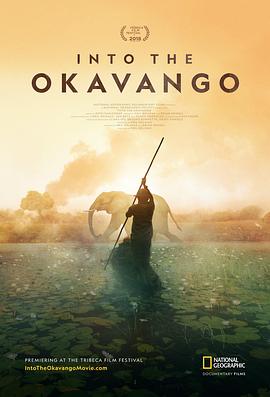详细剧情
长篇影评
1 ) 四点感慨
上影节看的,谁能想到看个自然风光类纪录片会热泪盈眶呢,结束时观众席上响起了一片的鼓掌声,我鼓掌是为记录片里这些人做的伟大的事业,也是感谢他们能把这个地方记录下来传递给我们。自然,野生动植物,河流,人类,战争,地雷这些词都联系了起来。很有感触的四点:一是很心疼大象,村落里大象头骨骸,还有一个躯干的,是一个小象的!一个国家捕猎大象不违法!捕猎者来自全世界各地!二是原来所谓的野火是人为故意的,但他们纵火捕猎也是为了生存呀,那谁错了?火是原罪吗?或许是缺乏对应的意识,但一直深处战争中的国家顾得了这个吗?所以交给时间吗?如里面那位土著民说的“我们以前也有过这个捕猎”,所以现在的“野火”也会成为以前吗?也看到了原来森林野火是如此的壮观和又残忍,莫名的心痛。三是战争,战争一中一个人的生命都变得渺小了起来。四是这些组织和参与一个项目的人,很敬佩他们能行动并且成功完成,而且还与政府建立沟通,寻求政府的协助,而且组织者很有前瞻性,若再往后推个几年再进行这个项目,这里还等得起吗?好想也像他们一样能有一个“伟大的项目”参与。
2 ) Where is the Okavango Delta?


From the official website of NG:
The Okavango River Basin provides a vital source of water to about 1 million people, the world’s largest population of African elephants and significant populations of lions, cheetahs and hundreds of species of birds. However, this once unspoiled oasis is now under siege due to increasing pressure from human activity. From National Geographic Documentary Films, Into the Okavango chronicles a team of modern-day explorers on their first epic four-month, 1,500-mile expedition across three countries to save the river system that feeds the Okavango Delta, one of our planet’s last wetland wildernesses.

---------------------------------------
Instead of focusing on one place, this documentary follows the scientific project led by ornithologists Steve, exploring three contries related to the Okawango Delta from upstream to downstream...It's an 80-days expedition to a place that has had no human intervention for millions of years, a place that is 'as perfect as it used to be'... In the end of the story, it becomes a spiritually transformative trip for Adjany, a young modern girl from Angola who is a refugee from the civil war and had no hope for her own country at the onset.
she said:
"What used to be my grandmother's apartment? ... I remember we are rushing to the toilet inside, all my cousins uncles. Aunts parents, my grandparents around a week in the corridor ...(The war) impacted our possibility to think a long-term , people saying now we don’t make plans for 5-10 years, history tells you that is the 'now' that matters ...can you make money now? can you support yourself now ? ...In the past 10 years Angola has changed so much. Because of development of building infrastructure and massive irrigation schemes..."
---------------------------------------
"We are setting on to do something no one has ever done before. Find the source and follow the water all the way down to the Delta. Try to figure out what’s happening to 3 countries rely on this watershed. No one is connecting them. I wanna bring me to water source of the Okavango...
Steve asked the researcher that can join the project and one of my university teachers thought I would be crazy enough, it was literally a leap of faith... "
---------------------------------------
As the movie states in the begining, one of the truths about the modern world is that people are becoming increasingly 'detached from each other' . There are fewer and fewer places for wildness in the human-made world, as the film shows, even places like Okawango face challenges such as less water and space for the indigneous inhabitants...
For today's human being,wild places like Okawango represent one of the few places that are out of human control.
The feeling of losing control is despiced by most of people...
--------------------------------------------------
Undoubtedly, "Into the Okavango" has received positive reviews from critics and audiences alike for its stunning cinematography, compelling storyline, and informative portrayal of the Okavango Delta and its inhabitants.
For me, what a impressive moment when Mr. Water incorporates with a local bird to hunt honey for a hole in a trunk. As a bee history and anthropology lover, it is really fascinating to see someone truely apply wild 'tricks' to connect with a multi-species ecosystem...
As Adjany said in the dawn of the documentary,
"Your senses surged up...
Atomes in our bodies change throughout this expedition, i feel so much deeper before I can actually connect and link different context of different things...
Very honest, here for now, I see the opportunity and I see the hope for things to change the country..."
As Steve wantS to express,
" I realise that everything in life is not like a machine, it doesn’t run itself. Wetland in the Delta above the water line is bulit by germites ....
Everything is connected"
-----------------------------------------------
What a satire it is to watch such an ecological documentary in a city of desire...
Few audiences delve into the content of this film and the deep thoughts it wants to convey . Instead, people tend to focus on the beautiful scenes in the documentary and how visually stunning it is...
------------------------------------


3 ) 大象沉入河水
1. 不算那种会引起深远感触的电影,但好像确实是我眼下的生活里正好缺乏的当头棒喝式的感官沉浸,用来告诉我现在所沉迷的烦恼都是人类无聊和自恋的表现。放下手机,放下所见的生活,去体会和更宏大的生命图景之间的连接。 2. 特别特别喜欢这部纪录片里的女性视角,女性讲述是如此生动、细腻和鲜活,更讶异地发现地球上如此遥远的土壤上的女性share和我一样的困惑和思考,因为女性是一种处境啊,即使context是全世界。听到那句“有时候重要的不是银行户头里有多少钱,而且你正在做什么”,是整部影片里我唯一一次真实地流泪。 3. 探险家说diversity和connection是世界的两大支柱,而这却是我们每个人都缺乏的东西。专门去Discovery的野生纪录片里寻找这些正是一种匮乏的表现,观众不过都是画饼充饥。 4. 扣了一星是因为某些应该存在的反思好像被广电总局剪过片一样如此刻意地从记述里抹去。有些画面不是不给旁白就能让人忽略的,比如说整片草原燃烧的大火,被整齐摆放的大象头骨,怎么可以用沉默就打发你让观众看到的这一切?整个纪录片一头一尾出现了两次大象沉入河水、血色在四周蔓延的画面,比elephant standing in the room还更难忽略的恐怕只有elephant bleeding in the river吧,但导演对此不置一词,配上的旁白是女主角说通过这次冒险她在自己的国家看到了希望。我不知道她看见的东西是怎么看见的,我只知道我看见了很多别的。 5. 最后,其实我私人最大的触动是探险家团队拖着四百公斤独木舟在荒野跋涉那十几天,Steve说 we have to believe it's worth it. 触动的原因不是因为觉得探险家很伟大,而且觉得,啊,原来如此,确实有比我的工作困难绝望艰苦一百倍的工作,yet human being still gotta explore. 我们可以的。我们可以做好这一切艰难而有意义的工作。





















以为能看很多大象,结果一直在看河流漂移和荒野求生……但是这件事本身是很有意义和价值啦,纪录片可以抓故事得更精彩些 #SIFF2023
“你怎么能这么自大 觉得你可以 在不属于你的河流上航行?”
场景巨美,片子本身能够被拍摄出来就已经不容易了
SIFF百美汇1厅。三星半,中规中矩的自然纪实和团队探险,无人机航拍+手持跟拍+长焦特写动物,叙事略显散漫,比如对战争逼迫原住民烧火狩猎的逻辑可再深入,但大银幕看那些亲眼见过的野生动物,象群的涉水,黑斑瞪羚的跳跃,百看不厌。connection & diversity,我们星球的两大支柱,人类的开发让成果和问题同时显现了。本片内嵌中文字幕。
这……纯粹就是跟踪记录吧,价值是探险本身带来的,文字里说发现了几十种未知生物,镜头里也没记录啊,前头遇到的困难倒是拍了很多,这部纪录片的意义对我而言就是人迹罕至的湿地无人机拍摄镜头吧,以及知道最后那段文字,这里将被政府合作保护起来。三角洲因为没有人类涉足才那么wild,镜头如实记录了人类的傲慢和自我感动。如果不是发现了人为火烧森林的行为,并提请政府保护这里,这好几个月这几个人的探险意义是什么呢……没有人类这里的世界会更美好呀。
感谢上影节让我发现了这样一个宝藏片,隔着屏幕了解了地球上我未曾认知过的宝藏流域。探索自然,会让我们明白作为humanbeing的意义。“人们终其一生寻找一个称之为‘家’的地方” 是啊,地球家园之上,何处为家
巡寻壮游
太棒
总有先驱者会展开对未知的冒险
目前最佳!
超棒的纪录片,好想有生之年亲眼去看看。
#SIFF2023# 走进奥卡万戈探险之旅,大自然的魅力。前半程昏昏欲睡,直到走进村庄走近野生动物之中。不一样的奇妙世界。
整个叙事有点凌乱。那个女生说:原来我的祖国真的有大象。
这辈子能去吗 睡着了一会 坐在第一排 银幕有地方该修了 走近科学。原来是野人在放火打猎导致没水 就是说别太离谱 已经过了5年了 不知道这地方咋样 当时还没有corona呢 应该更好了 一会去官网看看
2023SIFF
奥卡万戈河(Okavango River),非洲南部第四长河,全长1,600公里,源出安哥拉中部,上游段称库班戈(Kubango)河。跟着学者、向导组成的探险团队一起去非洲客厅、大象的家,119天从源头回到中心三角洲,标记包含鸟类、昆虫、植物等3万多自然数据用以未来生态保护使用(后来真的推动政府设立上游保护区)。整体结构清晰,画面真美,节奏舒服,结尾升华的略平庸。有一点比较欣赏,没有刻意激起矛盾,比如对于原住民为狩猎引发的大规模河域火灾破坏,小组并未道德绑架,而是走到村子里询问人们的生活,成为第一批进村的外来人员,当问到村里需要什么,村里人回答缺乏油盐医疗教育等,狩猎是他们生存的方式。意义大于技巧,五星。
太美了,最純粹之地,我回家了
Everything is alive, everything connects. 或许,荒野才是家园真正的样子。 在这部电影里,我找到一个可以解释非洲人为什么总给我留下乐观印象的理由:和平过于珍贵,比起忧虑未来的计划,活在当下更重要。
纪录片看得少,是都这么拍吗,感觉还是充满了人类傲慢视角的自述,看完只觉得是这组人完成了一次自己的探险,而非对这块区域的一次真正有价值的呈现或赞美,当然,片尾提到周边三国为三角洲的保护做了协定,那也算有点意义吧。
想当探险家,但是,怕虫子,怕脏,体力不行,算了,不当了吧……今天耳机里放circle of life